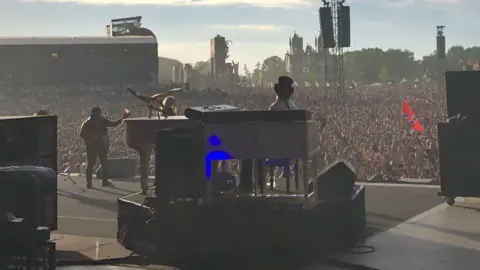Brexit: Pressure mounts on UK government to resolve EU touring visas for musicians
 Tim Brennan
Tim BrennanPressure is mounting on the UK government to resolve issues around EU touring visas for musicians and crews.
Since leaving the EU, British musicians are no longer guaranteed visa-free travel and may need additional work permits to play in some countries.
Composer and cross-bench member of the House of Lords, Michael Berkeley, said it left many in a "perilous position".
The Association of Independent Music called for the two sides "to speedily return to the negotiating table".
Meanwhile, a petition signed by Laura Marling, Biffy Clyro and Dua Lipa is calling on the government to "negotiate a free cultural work permit" that would allow "bands, musicians, artists, TV and sports celebrities that tour the EU to perform shows and events and carnet exception for touring equipment".
At the time of writing, more than 250,000 people have signed the petition.
The UK government confirmed on Monday that "the door remains open" for further talks.
The BBC has also asked the EU for a response.
What are the issues?
Now that free movement has ended, UK musicians and crews will need a visa for stays of longer than 90 days in a 180-day period. Certain EU countries will also require additional work permits on arrival; and touring bands will also have to pay for carnets (permits) for their equipment and merchandise.
According to the Association of British Orchestras, another barrier is the imposition of limits on road haulage - with new rules stating drivers must return to the UK after visiting two EU member states.
"This makes the standard touring model of moving musical instruments by truck from the UK to venues in multiple countries impossible," said the ABO.
"The UK's orchestras will need to look at hiring in European road haulage operators at additional expense."
What has the UK government said?
In December, the government said it had tried to secure better conditions for UK touring musicians during the Brexit negotiations, but its proposals were rejected by the EU.
Last weekend, a story in the Independent newspaper pushed back at those claims. In it, an unnamed EU source told the newspaper that a "standard" proposal to exempt performers from the cost and bureaucracy of obtaining permits had been proposed - but the UK refused to agree because "they were ending freedom of movement".
On Monday, a government spokeswoman told the BBC that the article was "incorrect and misleading speculation from anonymous EU sources".
"It is not true we turned down a bespoke arrangement from the EU to allow musicians to work and perform in member states," she said. "The UK Government has and always will support ambitious arrangements for performers and artists to be able to work and tour across Europe.
"As suggested by the creative arts sector, the UK proposed to capture the work done by musicians, artists and entertainers, and their accompanying staff, through the list of permitted activities for short-term business visitors," she continued. "This would have allowed musicians and support staff to travel and perform in the UK and the EU more easily, without needing work permits.
"Unfortunately the EU repeatedly refused the proposals we made on behalf of the UK's creative arts sector. We are clear that our door remains open should the EU change its mind. We will endeavour to make it as straightforward as possible for UK artists to travel and work in the EU."
What is the music world saying?
Radiohead's Thom Yorke called the government "spineless" for its handling of the situation; while The Charlatans' frontman Tim Burgess told The Independent that musicians "have been betrayed by this Brexit deal".
Composer Michael Berkeley has tabled a question about touring visas in the House of Lords, and hopes it will be debated next week.
"The combination of Covid and Brexit means that a lot of musicians are in a terribly perilous position at the moment," he told the BBC.
"It's a double whammy because many musicians are freelance and have fallen through the government support network and the government admits this."
Parts of the music industry have benefitted from the government's £1.57bn Culture Recovery Fund and furlough scheme, although Chancellor Rishi Sunak and Culture Secretary Oliver Dowden have previously acknowledged that their policies will not save every worker or organisation.
Berkeley believes the government is "supporting the fishing industry [worth around £1.4bn] in a way that they're not supporting the creative industries, and music [worth around £5.8bn] in particular."
 Getty/Reuters
Getty/Reuters"This is kind of an own goal if we can't sort it," he said.
"So, if we are to hold on to our precious cultural heritage, this really does need to be sorted out.
"British musicians in particular - and musicians doesn't just mean symphony orchestras and string quartets, it means rock groups like Radiohead, and dancers in touring bands - if these people can't tour we will be denying them, and the British economy, a huge slice of income," he added.
The Association of Independent Music (AIM) said UK artists could now face "more administrative costs and barriers" than those from different parts of the world, which they suggested did not constitute "a close partnership with our nearest neighbours".
"Much about Brexit is not as the UK music industry wanted and there are, inevitably, complexities to the UK's new relationship with the EU," said Aim CEO, Paul Pacifico.
"However, it is essential that we focus on real issues where they arise, such as work permits, VAT and data, and work with government and EU counterparts to fix them. We must remain disciplined and focussed to ensure the music industry makes the most of every opportunity in spite of these problematic areas whilst we continue to push for a better outcome."
The Musicians' Union called for renewed efforts to resolve the situation. "Negotiators on both sides should continue to acknowledge the importance of cultural life and its huge social and economic value by finding an acceptable solution," said general secretary Horace Trubridge.
'Storm in a teacup'
Taking a different view, The Telegraph's Neil McCormick described the debate as "a storm in a backstage teacup".
Music agent Paul Fenn, whose company Asgard Promotions boasts acts such as The Waterboys, Ray Davies, Emmylou Harris, Tom Waits and Alison Krauss, told the journalist that very little had changed.
Under the new post-Brexit agreement, he pointed out, EU countries will treat British people as third country nationals - just like Americans, Canadians and Australians. "Now, I make a living sending American artists around Europe and, with one or two exceptions, it's easy, we have no problems," said Fenn.

"On the surface there doesn't appear to be any changes for British acts going into Europe in 2021."
Promoter and music business consultant Chris Pleydell added: "For large promoters, it won't change anything. I know of not one band to ever spend 90 days touring Europe, it's absurd. Fourteen days in Europe is about the average."
The Who's Roger Daltrey was also sceptical of the impact. "What's [Brexit] got to do with the rock business?" he asked a Sky New reporter. "As if we didn't tour in Europe before the EU."
'Chaos' for crews
Other major music artists including Garbage, Ash, Holly Johnson, Rina Sawayama, Louis Tomlinson and Ronan Keating seemed to disagree, and have all encouraged their fans to sign the petition calling for action.
Tim Brennan, the live music camera director who set up the petition, believes that the new status quo would cause "chaos" for crews moving in and out of different countries.
He would like to see the introduction of a single work permit, valid for a year, allowing multiple entries across the EU.
"Unless the government acts fast, thousands of UK touring professionals will lose their livelihoods, with grim consequences for a UK success story," he wrote in his most recent blog.
"This dilemma isn't limited to music tours. It affects anyone who tours the EU professionally, from ballet dancers and orchestras to theatre productions and sports personalities.
"And the cast of thousands who put the stars in the spotlight when the lights go down - both on the continent and here in the UK, too."
Greg Parmley, CEO of Live, a representative body for the UK live music industry, echoed those sentiments, noting how the sector was already facing "a catastrophic situation" due to coronavirus shutting the industry down.
"All parties need to work quickly to ensure that once Covid restrictions are lifted UK artists are able to work across the EU with the same freedom that has been secured for people doing other business activity," he said.

Follow us on Facebook, or on Twitter @BBCNewsEnts. If you have a story suggestion email [email protected].
